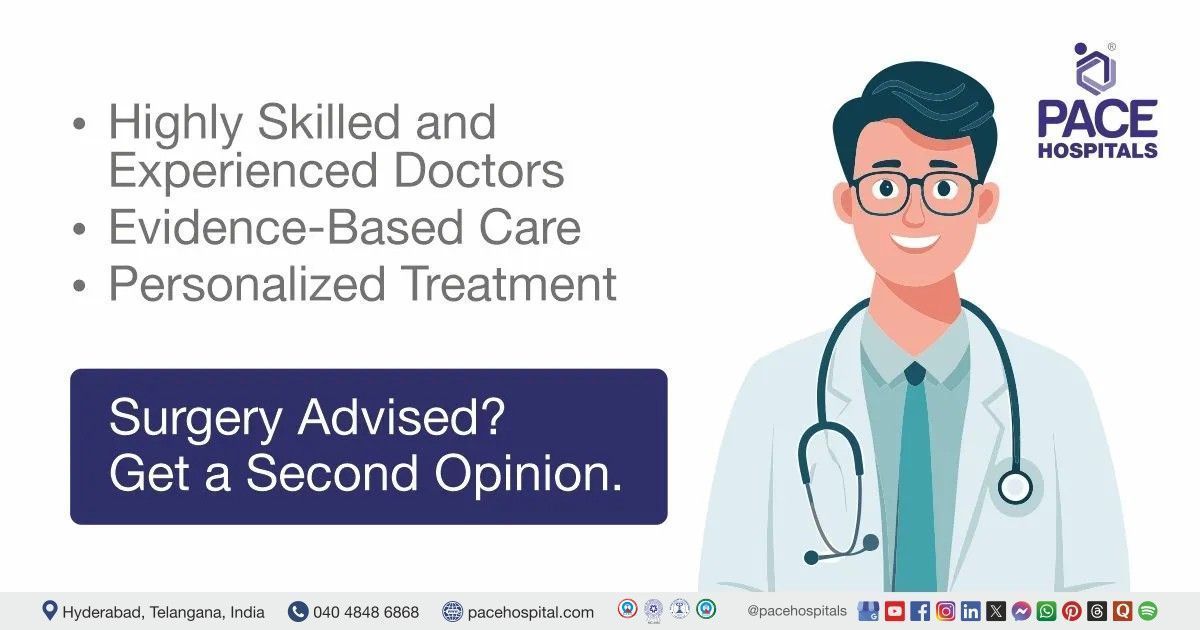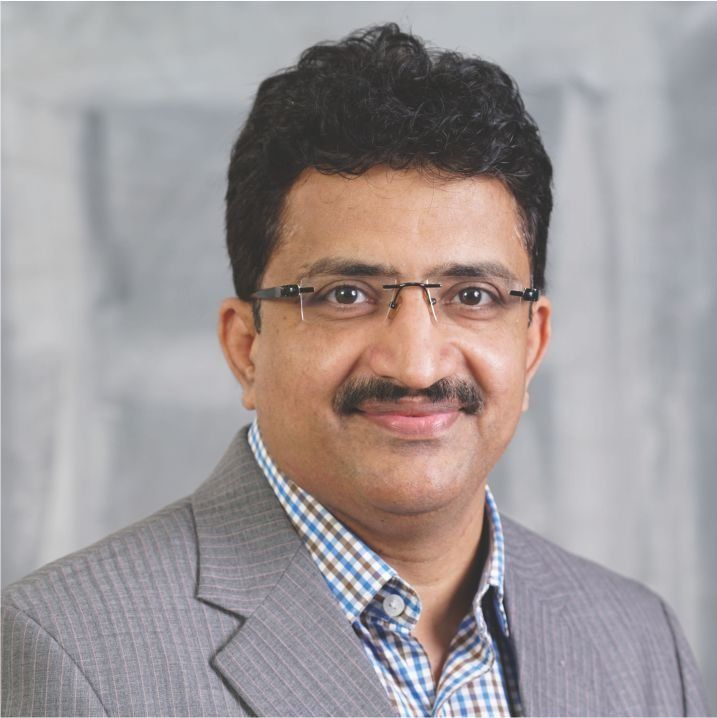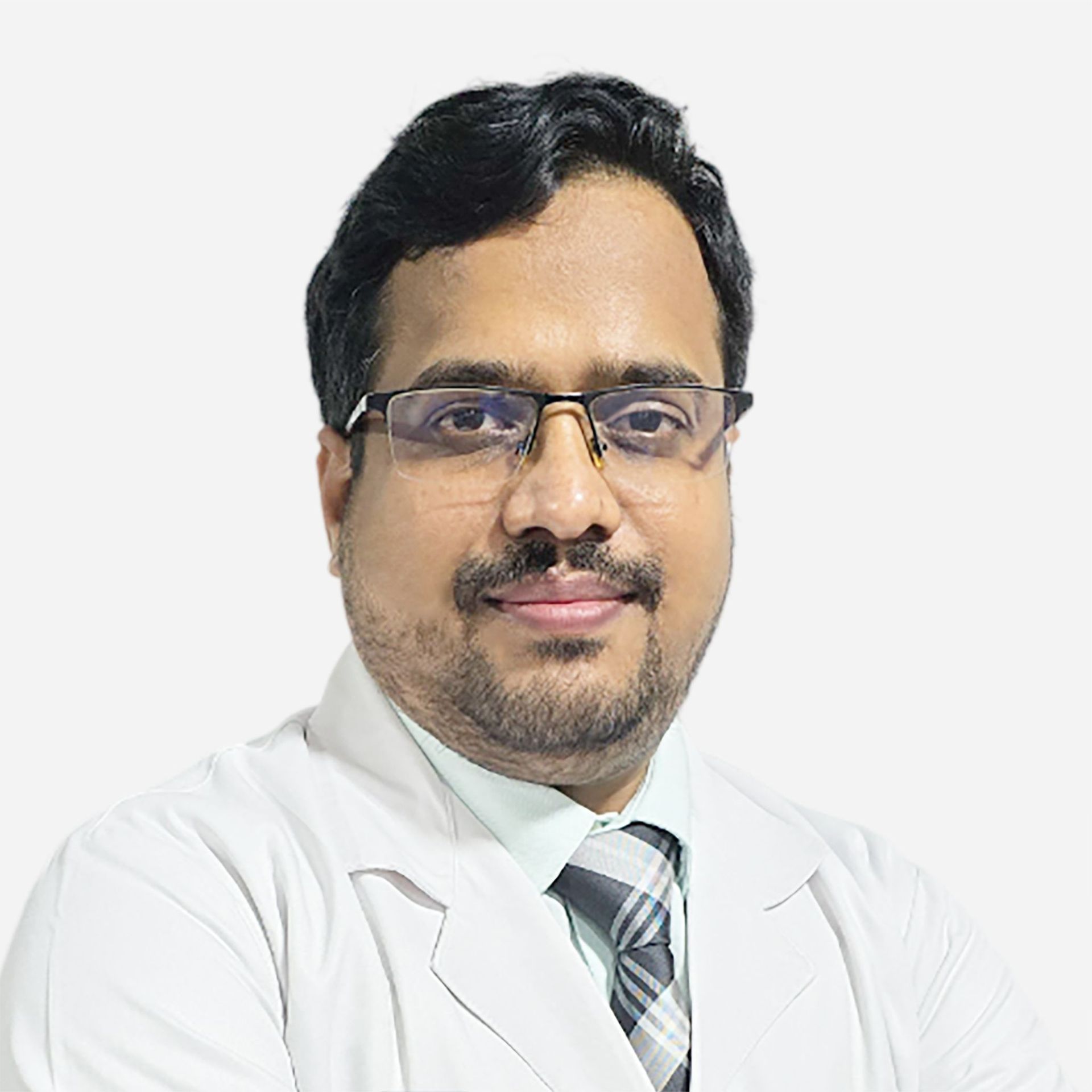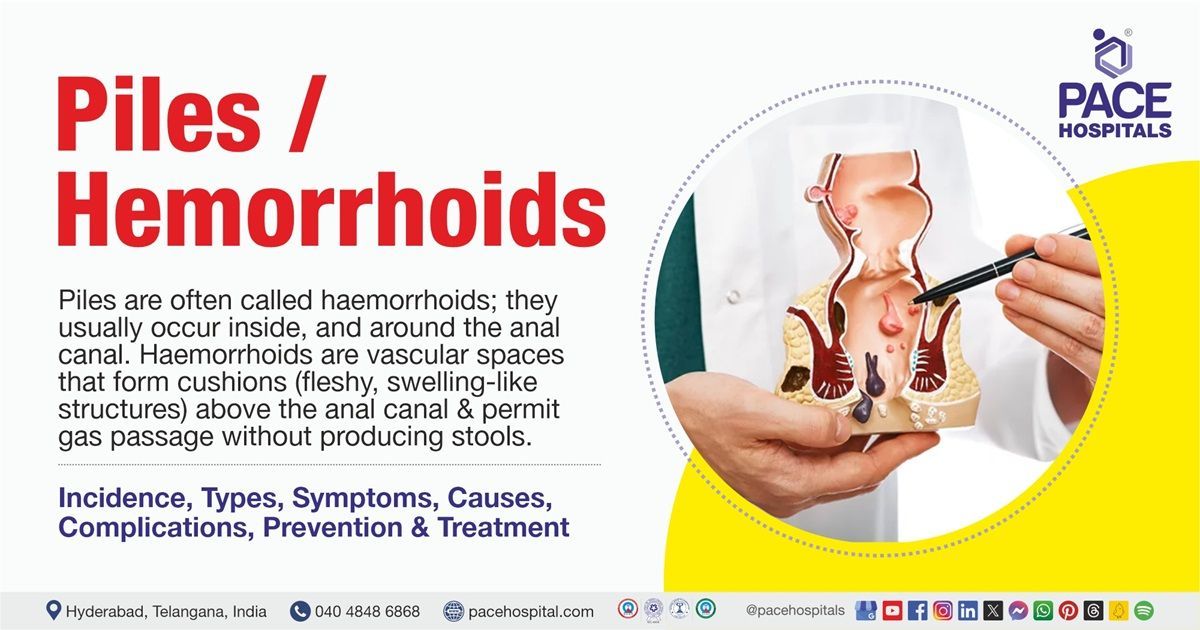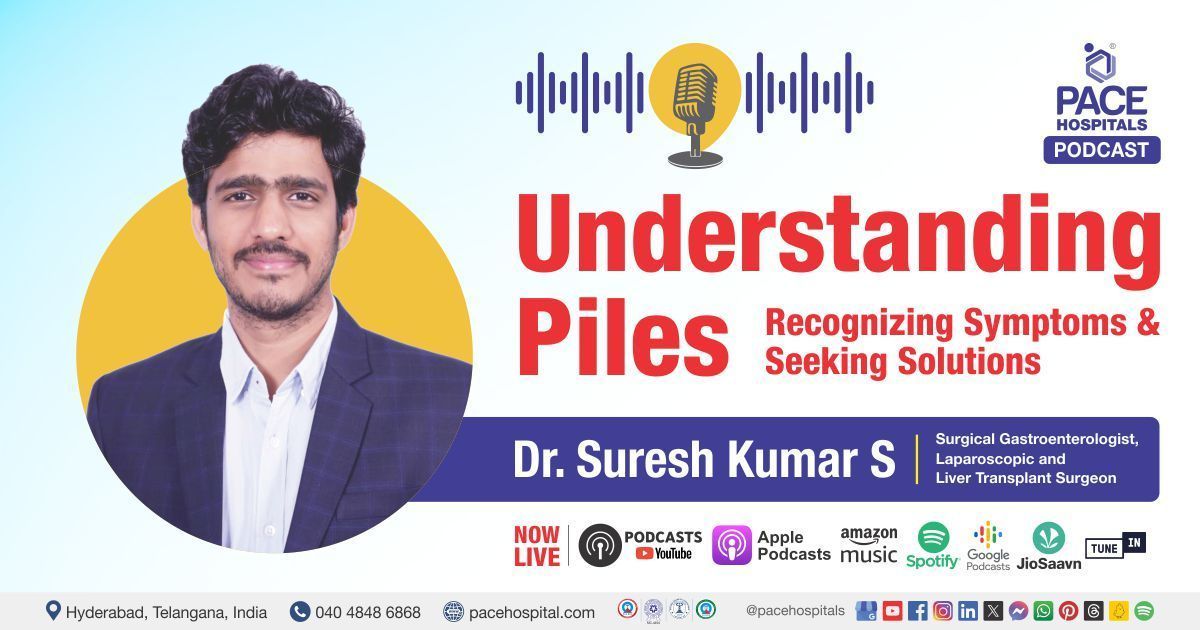Best Piles Specialist Doctor in Hyderabad for Personalised Care
PACE Hospitals
✅ Recommended by 9,452 Happy Patients. Get hassle-free appointments with Piles Doctor.
Dr. Govind Verma
MD, DM (Gastroenterology)
Experience : 30+ years
Interventional Gastroenterologist, Transplant Hepatologist, Pancreatologist and Endosonologist
Specialist
Specialist in Liver disorders: like Hepatitis B and C, Cirrhosis of Liver, Liver Cancer (HCC), Anal and rectal disorders: piles (hemorrhoids), anal fissures and anal fistulas, Pancreatic disorders: Pancreatitis, Pancreatic Tumour (Cancer), Inflammatory bowel disease: like Ulcerative Colitis and Crohn's Disease, Oesophageal and Anorectal Motility Diseases: Like Achalasia Cardia, Diffuse Oesophageal Spasm, Hirschsprungs, Functional Bowel Diseases
Expertise
Endoscopic Procedures like ERCP, endoscopic ultrasound (EUS) and EUS guided therapeutic interventions like EUS guided biopsy, EUS guided pancreatic pseudo-cyst drainage, pancreatic and bile duct stenting, interventional endoscopy like third space endoscopic surgery, like POEM, ARMS, GERD-X, Endoscopic Sleeve Gastroplasty (ESG), ESD, EMR & Hepato-Billiary Pancreatic Interventions
Consultation Details
Languages Spoken: English, Hindi, Telugu, Marathi
Timing: Mon to Sat - 10 AM to 7 PM
Location: PACE Hospitals, HITEC City
Dr. Suresh Kumar S
MBBS, MS (General Surgery), M.Ch (Surgical Gastroenterology)
Experience : 14+ years
Surgical Gastroenterologist, Minimally Invasive GI Surgeon and Advanced Laser, Laparoscopic Surgeon
Specialist
Specialist in gastrointestinal, pancreatic and hepatic diseases such as gastroesophageal reflux disease (GERD), hernias, piles, hemorrhoids, anal fistula, anal fissure hernias, chronic pancreatitis, hepatitis, non-alcohol-related fatty liver disease (NAFLD), colon and rectal cancer, appendicitis, bile duct stones etc.
Expertise
Laser treatment for piles, Laparoscopic cholecystectomy, laparoscopic common bile duct exploration (LCBDE), laparoscopic inguinal hernia and ventral hernia repair, laparoscopic fundoplication, laparoscopic hemicolectomy, laparoscopic low anterior resection, laparoscopic abdominoperineal resection, laparoscopic gastrectomy, stapled hemorrhoidectomy, laparoscopic appendectomy, bariatric surgery, lateral pancreaticojejunostomy, laser for piles, Whipple procedure (pancreaticoduodenectomy), hepatectomy, distal pancreatectomy etc. His special interest lies in diagnosing and treating gastroesophageal reflux disease and complex hernias, in addition to operating bariatric surgery for obesity.
Consultation Details
Languages Spoken: English, Hindi, Telugu
Timing: Mon to Sat - 9 AM to 6 PM
Location: PACE Hospitals, HITEC City
Dr. Padma Priya
MBBS, MD (Internal Medicine), DrNB (Medical Gastroenterology)
Experience : 9+ years
Consultant Gastroenterologist and Hepatologist
Specialist
Specialist in gastrointestinal (GI), pancreatic and hepatic diseases such as gastroesophageal reflux disease (GERD), anal and rectal disorders such as piles (hemorrhoids), anal fissures and anal fistulas, Inflammatory bowel disease (Ulcerative colitis and Crohn’s disease), Inflammatory bowel Syndrome, Peptic ulcers, Celiac disease, GI infections, Gallbladder stones, Biliary tract disorders, Liver diseases, Pancreatic disorders, Gastrointestinal bleeding, Diverticulitis, Eosinophilic Gastroenteritis, Gastrointestinal motility, Gastrointestinal cancer, Malabsorption Syndromes etc.
Expertise
ERCP, EUS, Colonoscopy, Sigmoidoscopy, Capsule endoscopy, Endoscopic mucosal resection, Endoscopic ultrasound-Fine needle aspiration / Fine needle biopsy, Polypectomy, Esophagogastroduodenoscopy (EGD), Endoscopic ultrasound (EUS)-guided, Cystogastrostomy, Spiral enteroscopy, Oesophageal manometry, Ano-rectal manometry, PEG tube insertion, Narrow-band imaging, Endoscopic variceal ligation, Argan plasma coagulation, Haemoclip deployment, NJ Tube placement, Oesophageal bougie dilation, Achalasia balloon dilation, Colonic stricture dilation, Pyloric balloon dilation, etc.
Consultation Details
Languages Spoken: English, Hindi, Telugu
Timing: Mon to Sat - 9 AM to 6 PM
Location: PACE Hospitals, HITEC City
Dr. Prashanth Sangu
MBBS, MS (General Surgery), M.Ch (Surgical Gastroenterology)
Experience : 12+ years
Surgical Gastroenterologist, Laser and Laparoscopic Surgeon
Specialist
Surgical Gastroenterology, HPB Surgery, Laparoscopic Surgery, Cancer surgeries related to Esophagus, Stomach, Small and Large intestine, Rectum, Liver, Gall bladder, Pancreas etc.
Expertise
General and laparoscopic surgeries such as Laparoscopic fundoplication for GERD, Radical & Sleeve gastrectomy, Antrectomy, Splenectomy, Bariatric surgeries, Lap cholecystectomy, Laparoscopic common bile duct exploration (LCBDE), Frey's procedure, LPJ obstruction, Hepaticojejunostomy, Radical Cholecystectomy, Whipple's procedure (pancreaticoduodenectomy), Hepatectomy, Colectomy, Low anterior resection, APR (Laparoscopic abdominoperineal resection), Rectopexy (Rectal prolapse surgery), Laser for Piles and Hemorrhoids, Surgery for fistula in ano.
Consultation Details
Languages Spoken: English, Hindi, Telugu
Timing: Mon to Sat - 9 AM to 6 PM
Location: PACE Hospitals, HITEC City
Dr. P Arun Kumar
MBBS, DNB (General Medicine), DM (Medical Gastroenterology)
Experience : 7+ years
Consultant Gastroenterologist and Hepatologist
Specialist
Dr. P Arun Kumar is recognized for his expertise in advanced diagnostic and therapeutic gastroenterology and hepatology procedures, offering comprehensive care for complex gastrointestinal and liver conditions.
- Upper GI Endoscopy
- Colonoscopy and Sigmoidoscopy
- Capsule Endoscopy
- Endoscopic Mucosal Resection (EMR)
- Polypectomy (Hot and Cold Snare)
- Endoscopic Variceal Ligation (EVL)
- Argon Plasma Coagulation (APC)
- Endoscopic Hemoclipping
- Esophageal and Colonic Dilatation
- CRE Balloon Dilatation
- Colonic Stricture Dilatation
- PEG and NJ Tube Placement
- Narrow Band Imaging (NBI)
- Diagnostic and Therapeutic Endoscopic Ultrasound (EUS)
- Pancreatico-biliary Endoscopic Interventions
- Esophageal and Anal Manometry
Expertise
With a strong focus on evidence-based and patient-centered care, Dr. P Arun Kumar specializes in diagnosing and managing a wide spectrum of gastrointestinal, liver, pancreatic, and functional bowel disorders.
- Gastroesophageal Reflux Disease (GERD)
- Dyspepsia and Reflux Disorders
- Peptic Ulcer Disease (Gastric & Duodenal Ulcers)
- H. Pylori–associated Gastritis
- Acute and Chronic Diarrhea
- Functional Bowel Disorders
- Irritable Bowel Syndrome (IBS)
- Chronic Constipation and GI Motility Disorders
- Neuro-gastroenterological Conditions
- Inflammatory Bowel Disease (Ulcerative Colitis & Crohn’s Disease)
- Celiac Disease and Malabsorption Syndromes
- Gastrointestinal Bleeding
- Esophageal Disorders, including Eosinophilic Esophagitis
- Esophageal Carcinoma
- Acute and Chronic Pancreatitis
- Biliary Tract Disorders
- Acute and Chronic Liver Diseases
- Viral Hepatitis (A, B, C, D & E)
- Metabolically Dysfunctional-Associated Steatotic Liver Disease (MASLD)
- Fatty Liver Disease and Alcohol-related Liver Disease
Consultation Details
Languages Spoken: English, Hindi, Telugu
Timing: Mon to Sat - 9 AM to 6 PM
Location: PACE Hospitals, HITEC City & Madinaguda
Top Piles Specialist in Hyderabad for Safe and Painless Piles Treatment
PACE Hospitals is recognised for having the Top Piles Specialist in Hyderabad, India, supported by a team of experienced piles doctors dedicated to treating piles (haemorrhoids) and related anorectal conditions. We focus on accurate diagnosis, patient comfort, and personalised care plans that ensure safety, quick recovery, and long-term relief for every patient.
From the first consultation, evaluation is conducted in a detailed, patient-focused manner through clinical examination, advanced diagnostic assessments, and, when required, proctoscopic or imaging evaluation. Our expert piles specialists develop personalized treatment plans tailored to the severity of the condition, overall health, and lifestyle needs, ensuring effective, minimally invasive, and easy-to-follow care.
Our care options at PACE Hospitals include medication, lifestyle modification, and advanced laser or minimally invasive procedures for faster recovery and minimal discomfort. With compassionate guidance, our specialists provide complete support from diagnosis to treatment and follow-up, helping patients achieve lasting comfort and confidence.
People across Hyderabad trust PACE Hospitals for expert, compassionate care for piles. The hospital is home to the best doctor for piles in Hyderabad, offering precise diagnosis and modern treatment with a focus on patient comfort. Our specialists use advanced laser techniques to reduce pain and speed recovery. Counted among the best piles specialist doctors in Hyderabad, India, PACE Hospitals combines medical expertise, advanced technology, and a caring approach to provide long-term relief from piles and related conditions.
Expert Piles Specialist Explains Causes, Diagnosis & Treatment
Frequently Asked Questions (FAQs) on Piles (Hemorrhoids)
What are Grade 1, 2, 3, and 4 piles?
The degree to which internal hemorrhoids prolapse or stretch and bulge outside of the anus can determine the grade.
- Grade 1: Prolapse is not seen in grade 1 piles
- Grade 2: One can observe prolapse, but it goes on its own
- Grade 3: Prolapse is seen and it must be pushed back in by the patient
- Grade 4: Prolapse that even patient cannot be pushed back in.
Consult a piles specialist doctor in Hyderabad, India for proper evaluation and grading.
Who is most at risk of developing piles?
Anyone with poor lifestyle and dietary habits may develop piles, but there are few risk factors as mentioned below which makes certain people more likely to be at risk than others:
- Elderly aged people are more prone to get piles due to weaker rectal tissue
- As pregnancy puts pressure on rectal veins, pregnant women are more likely to have piles
- Obese people are comparatively at higher risk
- Constipation and diarrhea can strain to the rectal veins and leads to hemorrhoids
- Familial history
- Low-fiber diet
- Too much time to pass stools
- Irritable bowel syndrome.
Early diagnosis by a piles specialist in Hyderabad, India helps prevent complications.
Who is the best piles doctor in Hyderabad?
At PACE Hospitals, piles treatment is provided by experienced piles specialist doctor in Hyderabad, including Dr. Govind Verma, Dr. Suresh Kumar S, Dr. Padma Priya, and Dr. Prashanth Sangu. They evaluate and manage haemorrhoids that cause bleeding, pain, swelling and discomfort, offering a full range of treatment options from medication and simple clinic procedures to laser treatment and minimally invasive surgery to ensure effective relief and long-term comfort.
Are piles more prevalent in pregnant women?
Yes, hemorrhoids or piles are more prevalent in pregnant women, especially in their last trimester. Almost 30-40% of pregnant women gets hemorrhoids during their pregnancy. This is due to the extra pressure on the blood vessels in the pelvic area. Constipation too can be another factor for piles being more prevalent in pregnant women. Consultation with the best piles doctor in Hyderabad, India ensures safe and effective management during pregnancy.
Is it possible to have piles without any noticeable symptoms?
Yes, internal hemorrhoids are usually not felt or seen., and they are mostly painless in nature unless they prolapse. So, it is possible to have hemorrhoids without any noticeable symptoms, especially internal hemorrhoids. However, straining or irritation while passing stools can be seen in internal hemorrhoids and this might cause bleeding without pain. Such conditions should be examined by the best doctor for piles in Hyderabad, India for accurate diagnosis.
What are the different types of piles, and how do internal piles differ from external piles?
Based on the location, hemorrhoids can be classified as internal or external piles.
- Internal piles: The anus and lower rectum's lining is where these enlarged veins originate. Although they are usually not painful, they can bleed.
- External piles: The external hemorrhoids develop under the skin, with enlarged veins around the anus. They occasionally bleed and can be unpleasant and uncomfortable.
Visit the best
piles surgeon in Hyderabad, India for proper assessment and treatment options.
Do different types of piles require different treatments?
Yes, treatment for piles depends on several factors like type, severity and grade of hemorrhoids etc. Grade 1 piles can be treated by making dietary and lifestyle changes and using NSAIDS if required. Grade 2 and grade 3 Piles are mostly treated non surgically, with medications alone. Whereas High grade internal hemorrhoids usually require surgery. External hemorrhoids mostly do not require any treatment, unless they become extremely discomfortable and painful. For advanced grades, consult the
best surgeon for piles in Hyderabad, India for proper treatment options.
Is it safe to treat piles during pregnancy?
Yes, usually it is safe to get treated for piles during pregnancy. Mostly, topical treatment is preferred to treat piles which includes creams, suppositories or ointments that are applied topically and provide short-term relief from pain, itching and bleeding. As the amount of drug absorbed into systemic circulation via rectal route is low, it is safe for baby. Even laser surgery can be done, which is fast-acting and precise. Pregnant women should consult a
hemorrhoid specialist for safe and effective treatment options.
Can piles be hereditary or run in families?
Yes, hereditary is one of the factors of hemorrhoids. The familial risk of developing hemorrhoids is more as the genes that are related to hemorrhoids are highly expressed in blood vessels and gastrointestinal tissues.
It is advisable to consult the
best doctor for piles treatment in Hyderabad at PACE Hospitals if you have a family history.
What are the signs that indicate piles are getting worse?
Incase of piles getting worse, the below mentioned symptoms can be seen:
- Bleeding
- Itching
- Lumps
- Prolapse
- Per rectal bleeding
- Feeling of unemptied bowls
- Pain around the anal area
If symptoms persist, consult a
piles specialist doctor for timely care.
Is swelling or a lump near the anus a sign of piles?
Most of the times, a lump or swelling around the anus could be a sign of hemorrhoids. The lump would be tender and hard and causes itching and pain around the anal region. It is recommended to consult doctor if anyone notices a lump near the anus, so that the doctor would perform physical examination and confirm the lump if it is hemorrhoid. Seek evaluation from an
experienced piles doctor to confirm the condition.
Can piles be misdiagnosed as another condition?
Yes, most of the times, hemorrhoids share the similar symptoms with other conditions like colon cancer, anal fissures, or inflammatory bowel disease. The common symptoms include rectal bleeding or lumps in the anus, minor tears in the anus, itching and burning in the rectal area, etc. It’s important to get examined by an
expert piles specialist to rule out other conditions.
What risk factors increase the chances of developing piles?
The majority of risk factors that could cause hemorrhoids are mentioned below:
- Sedentary lifestyle
- Straining while passing stools
- Low-fiber diet and consumption of foods high in saturated fats
- Pregnancy
- Obesity
- Chronic constipation and diarrhea
- Familial history
Consult the
top piles specialist doctor in Hyderabad at PACE Hospitals to reduce your risk through preventive care.
What are the complications associated with thrombosed or prolapsed piles?
Thrombosed piles are the blood clots developed inside the hemorrhoid tissue. Major complications of this thrombosed or prolapsed piles are that they may burst and cause bleeding, thereby causing anemia in long term and painful skin ulcerations. Consult the famous piles specialist in Hyderabad at PACE Hospitals for expert care in such cases.
Can piles recur after treatment?
Yes, piles can recur after treatment, especially in people with poor lifestyle and dietary habits. Sitting or standing for longer periods contributes to recurrence of hemorrhoids. Constipation, low-fiber diet, obesity, pregnancy etc. are some of the risk groups where the chances of recurrence of hemorrhoids Is usually high.
Regular follow-up with a
piles specialist doctor in Hyderabad, India helps prevent recurrence.
Can chronic constipation or diarrhea lead to piles?
Yes, chronic constipation or diarrhea might lead to piles. In both cases, straining while passing stools would create pressure on the veins around the anal region which can cause hemorrhoids.
Visit a
good piles doctor for management and preventive guidance.
Will piles go away on their own?
Yes, most of the times piles go away on their own, especially grade 1 or grade 2 internal hemorrhoids. However, there are few things that a person with hemorrhoids can do to ease symptoms and prevent recurrence of piles like eating fiber rich food, consuming more fluids, not straining while passing stools etc.
Consult an
experienced doctor for piles treatment in Hyderabad, India for advice on managing and preventing recurrence.
Are piles dangerous? Can they lead to more serious health issues?
Piles are usually not dangerous and life threatening. However, in case of severe inflammation of the hemorrhoids or untreated piles, they can lead to serious health issues like anemia, anal stenosis, blood clot, anal infections etc. It is always important to get proper medical support for piles to avoid complications or recurrence of hemorrhoids.
Visit the
best piles specialist in Hyderabad, India for early and effective management.
Is surgery always necessary to treat piles?
No, surgery is not always the initial treatment plan to manage piles. Most of the early-stage piles can be treated by making lifestyle changes, increasing fluid intake, consuming fiber rich food etc. There are other non-surgical treatments available such as rubber band ligation, sclerotherapy, electrotherapy or infrared coagulation etc. to treat moderately sever piles. Surgery is considered to be the last treatment modality in case of hemorrhoid therapy.
The
best piles specialist doctor in Hyderabad at PACE Hospitals can suggest the most suitable treatment option.
What diagnostic tests are used to diagnose piles?
There are various diagnostic tests available to confirm hemorrhoids or piles such as, physical examination, digital rectal examination, anoscopy, proctoscopy,
sigmoidoscopy,
colonoscopy, barium enema etc. Presence of hemorrhoids is usually better confirmed with digital rectal examination and the other tests help in understanding the severity or grade of hemorrhoids.
Diagnosis should be made under a
piles specialist doctor in Hyderabad, India for accuracy.
Will any blood tests be required to assess the severity of my piles?
By looking for blood in a stool sample that is invisible to the human eye, a fecal occult blood test can assist in the diagnosis of piles, also known as hemorrhoids. The severity of an acute bleed, however, might not be readily apparent from a complete blood count (CBC).
For detailed evaluation, consult an
experienced piles doctor.
What is a digital rectal exam, and why is it necessary for diagnosing piles?
Digital rectal exam helps in diagnosing hemorrhoids by examining the lower rectum and anus. To perform this, the doctor inserts lubricated, gloved finger into the rectum for presence of any abnormalities. This examination is fast, painless and the foremost test to determine if the patient is having hemorrhoids, anal fissures, fistula etc.
Consult the
best doctor for piles treatment in Hyderabad at PACE Hospitals for expert diagnostic care.
What are the different treatment options available for piles?
There are various treatment options available for hemorrhoids, and it depends on factors such as type, severity etc. Some of the major treatment options are as follows:
- Non-surgical treatment
- Rubber band ligation
- Sclerotherapy
- Infrared coagulation
- Laser treatment
- Surgical treatment
- Hemorrhoidectomy
- Stapled hemorrhoidopexy
- Lifestyle changes
- Rich in fiber diet
- Consuming more liquids
- Avoiding alcohol and smoking
Treatment options can be best planned with an experienced piles doctor at PACE Hospitals.
What are the common types of minimally invasive treatments available for piles?
No, minimally invasive treatments are not effective for all stages and types of piles. Rubber band ligation procedure is reliable mainly for grade II or grade III hemorrhoids, Sclerotherapy or cryotherapy is effective in treating grade I or grade II hemorrhoids, and stapled hemorrhoidopexy is effective in treating advanced hemorrhoids. Consult the
top piles specialist doctor in Hyderabad at PACE Hospitals to choose the best approach.
Are minimally invasive treatments effective for all stages of piles?
No, minimally invasive treatments are not effective for all stages and types of piles. Rubber band ligation procedure is reliable mainly for grade II or grade III hemorrhoids, Sclerotherapy or cryotherapy is effective in treating grade I or grade II hemorrhoids, and stapled hemorrhoidopexy is effective in treating advanced hemorrhoids.
For better recovery, seek guidance from the
famous piles specialist in Hyderabad at PACE Hospitals.
Can minimally invasive treatments prevent the recurrence of piles?
Yes, some of the minimally invasive techniques help in preventing the recurrence of piles. Rubber band ligation helps is a popular non-surgical procedure with low recurrence rate, Infrared coagulation carries lifestyle modifications and diet support to prevent the recurrence. However, cryotherapy and sclerotherapy have high recurrence rates. Consultation with a
good piles doctor ensures effective prevention plans.
Which doctor to consult for piles?
If having symptoms of piles, such as pain, itching, bleeding, or discomfort in the anal region, it is recommended to consult a specialist doctor who has experience and expertise in treating piles. A surgical gastroenterologist, proctologist or a colon and rectal surgeon are the types of specialist doctors who specialize in diagnosing and treating disorders of the anus, rectum, and colon. They are trained to perform various procedures and surgeries to treat piles (hemorrhoids), including minimally invasive procedures like rubber band ligation and laser surgery. A specialist doctor can also provide you with advice on how to manage your symptoms and prevent further complications. Consult the experienced doctor for piles treatment in Hyderabad, India for comprehensive care.
What is the cost of piles treatment in Hyderabad?
Piles treatment cost in Hyderabad can vary from ₹40,000 to ₹1,25,000 (US$480 to US$1500), it depends on several factors, such as the severity of the condition, the type of treatment required such as laser or laparoscopic surgery, hospital charges, post-operative care, and any additional diagnostic tests. Actual cost may be higher or lower based on the individual case, consult our team of the best doctor for piles in Hyderabad to get a more accurate cost estimate based on your specific needs and requirements.
The cost of piles treatment in Hyderabad can be broken down into the following categories:
- Consultation Fees: ₹500 – ₹800
- Non-Surgical Treatment (medical treatment): ₹8,000 – ₹15,000
- Minimally Invasive Treatments (laser surgery or rubber band ligation): ₹40,000 – ₹75,000
- Surgical Treatment (hemorrhoidectomy): ₹65,000 – ₹1,25,000
What our patients have to say
Experts Perspective
Related Resources
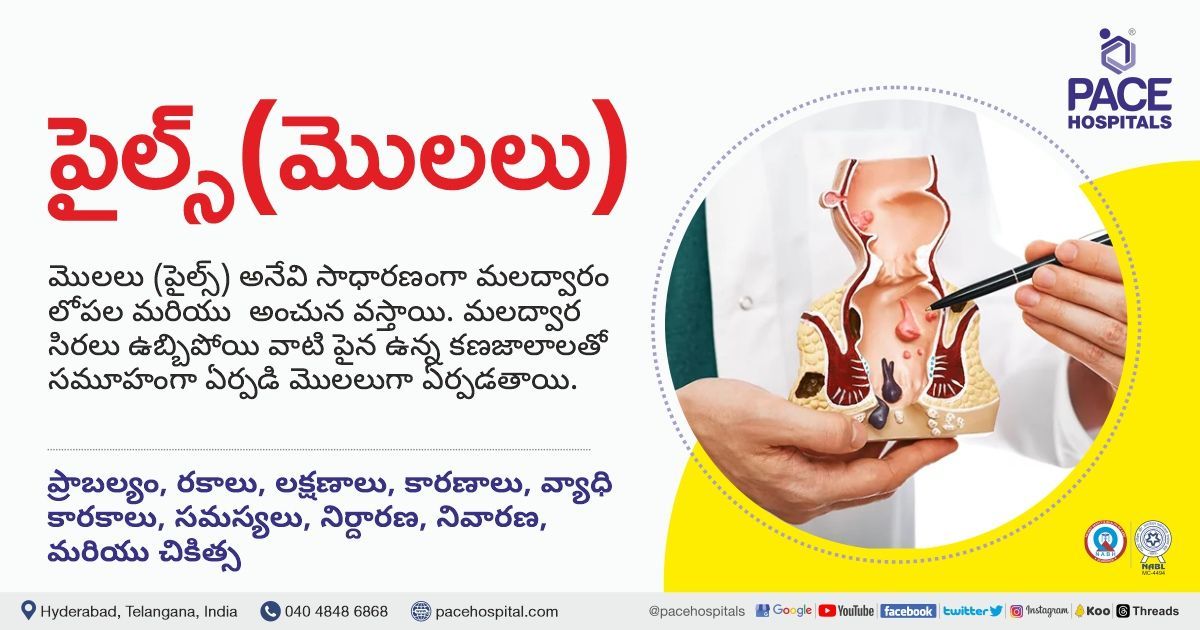
Why choose PACE Hospitals?
- A Multi-Super Speciality Hospital.
- NABH, NABL, NBE & NABH - Nursing Excellence accreditation.
- State-of-the-art Liver and Kidney transplant centre.
- Empanelled with all TPAs for smooth cashless benefits.
- Centralized HIMS (Hospital Information System).
- Computerized health records available via website.
- Minimum waiting time for Inpatient and Outpatient.
- Round-the-clock guidance from highly qualified super specialist doctors, surgeons and physicians.
- Standardization of ethical medical care.
- 24X7 Outpatient & Inpatient Pharmacy Services.
- State-of-the-art operation theaters.
- Intensive Care Units (Surgical and Medical) with ISO-9001 accreditation.
Share on
Request an appointment
Fill in the appointment form or call us instantly to book a confirmed appointment with our super specialist at 04048486868
Appointment request - health articles
Recent Articles


